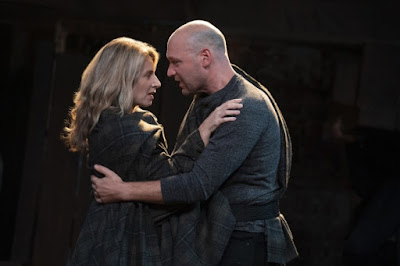Theater Review: John Doyle directs a rapid-fire Macbeth
Macbeth
Written by William Shakespeare
Directed by John Doyle
Starring Corey Stoll and Nadia Bowers
Classic Stage Company, Manhattan
October 30, 2019
Parasite
Written and Directed by Bong Joon-ho
Wow, that was a brisk Macbeth!
The play is already a concise one by Shakespeare’s standards with fewer
side-plots and subsidiary characters to dilute the playwright’s focus on the
sociopathy of Macbeth and his wife, and how they murder the king and violently
die. But this bracing version by John Doyle came in at 100 minutes in a single
intense act, a short-duration record in my experience. Doyle is known for his
creative, scaled-down Broadway revivals of works like Sweeney Todd and Company
(where the actors also played orchestral instruments). He brought his principles
of conciseness to bear here. There was a minimalist black set with a single Tudor-style
balcony. There were minimal cuts to the text, but things were mostly kept
moving by the absence of scene changes, moody witch-doings on the heath, and poignant
pauses during soliloquies. Movie/TV star Corey Stoll (House of Cards,
Homeland) was a New York sociopath, brisk and clipping, and a bit neurotic
and sarcastic in his dialogue, yet very aware of the meaning of his words—a very
fine performance. Stoll’s wife Nadia Bowers was good but not great as Lady
Macbeth. I was never really convinced by her evil descent into madness. Director
Doyle compacted the play using only nine actors to play the 16 characters, and
relied on their acting talent rather than costume changes to pull off the multiple
roles. The cast did so brilliantly, and continued the current trend of gender-
and race-blind casting decisions (e.g. King Duncan was played by the
outstanding Mary Beth Peil).
So this was a distinctive and charged Macbeth.
But I don’t think it really was the right approach for this play. Macbeth
lives on the intersection of supernatural and natural, and should feel vaguely
unreal. Shakespeare loved exploring evil (socio- or psychopathy, if you will)
using the vocabulary available in the sixteenth century. Why do people kill and become
evil? While Othello’s Iago is perhaps the most clinically drawn sociopath,
and Hamlet explores the psychological pathways in the most modern way, Macbeth
considers all possibilities. Is evil demonic possession by spirits? Lady
Macbeth implies this at one point, as she ponders murdering the king:
That tend on mortal thoughts, unsex me here,
And fill me from the crown to the toe top-full
Of direst cruelty! make thick my blood;
Stop up the access and passage to remorse
“Spirits that tend on mortal thought”
is a wonderful way of saying “the devil made me do it”. Or is evil simple
opportunism, grasping for status and riches (as Macbeth does once tantalized by
the witches’ prediction that he will be king). Or is it being goaded on by
others, as Lady Macbeth does to her husband? In Macbeth Shakespeare
provides a nice Tudor era differential diagnosis for evil behavior, and does so
by alternating Macbeth’s Freudian-style self-analysis ("Is this a dagger which I see before me….or art thou but a dagger of the mind, a false creation, proceeding from the heat-oppressed brain?”) with spells, witches and spirits.
Director Doyle dispensed with distinct
witches altogether, having the massed cast members chant their spooky lines. Is
the director adding another precipitant of evil—the pressures or norms of society?
As an aside, this is the theme of the currently popular film Parasite by
Korean director Bong Joon-ho, which entertainingly mixes farce and tragedy to
show how an underclass family co-ops the residence and lifestyle of an upper
class family, complete with a Macbeth-style denouement, even including
blood on the hands of characters. Mr. Bong seems to agree with director Doyle
that society is at least a major root of evil but, appropriate to our era,
frames the problem specifically as income disparity. I think this issue would
have been such a given in Shakespeare’s time that it was an uncommon theme for
him, except for occasional side comments like this one from Pericles:
First Fisherman: Why, as men do a-land; the great ones eat up the little ones. I can compare our rich misers to nothing so fitly as to a whale.
Pericles 2.1.69-70.
Now, back to this Macbeth
production. Unfortunately, the rapid-fire pace detracted from the textured
overlay of these elements that makes Macbeth so unique. Removing the
atmospheric, swaying witches not only deprived the play of its most distinctive
element, but altered the pacing, so the whole thing came across as an episode
of Law and Order, but without the whodunnit aspect. Evil takes time to
explicate—the extended rantings of Hannibal Lecter in The Silence of the Lambs
serves real dramatic purpose—and this Macbeth lacked those times for
reflection. I left bewildered at why Macbeth did what he did, and had to
provide all the reflection myself by rereading parts of the play when I got
home. Oddly, while the rapid pace should have made the crescendo to the final
carnage more dramatic, it actually detracted from it, making it more trivial
somehow. So while Doyle’s brisk Macbeth made for an exciting experience,
and I would love to see Stoll again in other roles, it was not a particularly
satisfying immersion into Shakespeare’s occult-psychologic cauldron.

Comments
Post a Comment